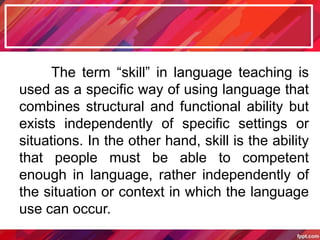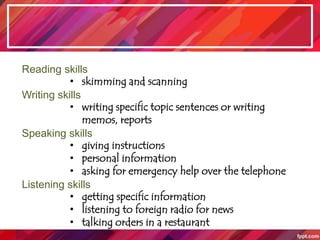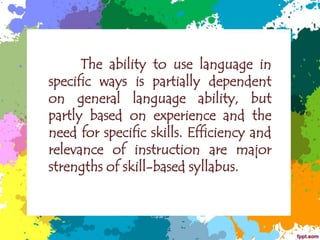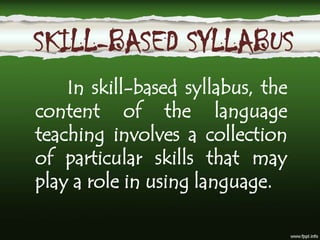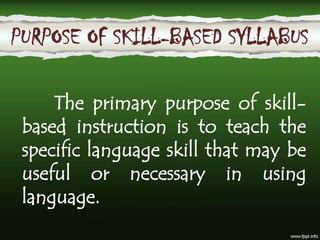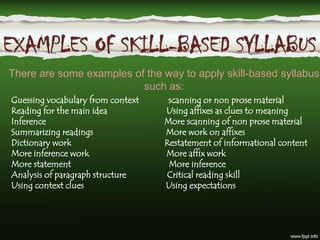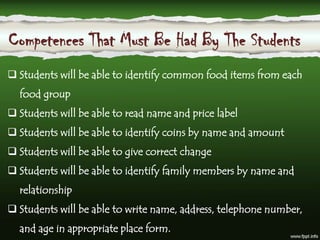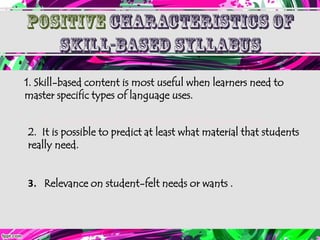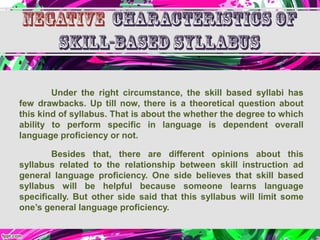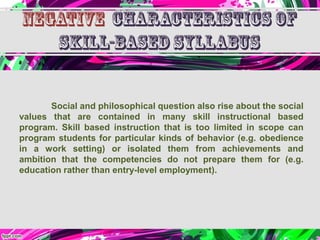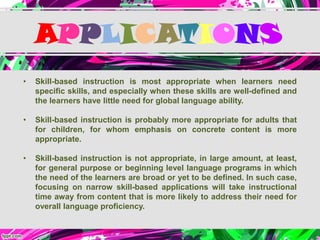SKILL BASED SYLLABUS
- 2. The term âskillâ in language teaching is used as a specific way of using language that combines structural and functional ability but exists independently of specific settings or situations. In the other hand, skill is the ability that people must be able to competent enough in language, rather independently of the situation or context in which the language use can occur.
- 3. Reading skills âĒ skimming and scanning Writing skills âĒ writing specific topic sentences or writing memos, reports Speaking skills âĒ giving instructions âĒ personal information âĒ asking for emergency help over the telephone Listening skills âĒ getting specific information âĒ listening to foreign radio for news âĒ talking orders in a restaurant
- 4. The ability to use language in specific ways is partially dependent on general language ability, but partly based on experience and the need for specific skills. Efficiency and relevance of instruction are major strengths of skill-based syllabus.
- 5. In skill-based syllabus, the content of the language teaching involves a collection SKILL-BASED SYLLABUS of particular skills that may play a role in using language The primary purpose of skill-based instruction is to teach the specific language skill In skill-based syllabus, the that may be useful or necessary in using language. Skills are things that people must be able to do to be competent in a language. Unlike situational syllabi where content of the language functions are grouped together into specific language use settings, skill-based syllabi group linguistic competencies (pronunciation, vocabulary, grammar and discourse) together into generalized types of behavior, such as listening to spoken teaching involves a collection language for the main idea, writing well-formed paragraphs, specific purpose writing, and so forth. of particular skills that may play a role in using language.
- 6. In skill-based syllabus, the content of the language teaching involves a collection PURPOSE OF SKILL-BASED SYLLABUS of particular skills that may play a role in using language The primary purpose of skill-based instruction is to teach the specific language skill that may be useful or necessary in using language. Skills are things that people must be able to do to be competent in a language. Unlike situational syllabi where The primary purpose of skill- functions are grouped together into specific language use settings, skill-based syllabi group linguistic competencies (pronunciation, vocabulary, grammar and based instruction is to teach the discourse) together into generalized types of behavior, such as listening to spoken language for the main idea, writing well-formed paragraphs, specific purpose specific language skill that may be writing, and so forth. useful or necessary in using language.
- 7. EXAMPLES OF SKILL-BASED SYLLABUS There are some examples of the way to apply skill-based syllabus such as: Guessing vocabulary from context scanning or non prose material Reading for the main idea Using affixes as clues to meaning Inference More scanning of non prose material Summarizing readings More work on affixes Dictionary work Restatement of informational content More inference work More affix work More statement More inference Analysis of paragraph structure Critical reading skill Using context clues Using expectations
- 8. Competences That Must Be Had By The Students ïą Students will be able to identify common food items from each food group ïą Students will be able to read name and price label ïą Students will be able to identify coins by name and amount ïą Students will be able to give correct change ïą Students will be able to identify family members by name and relationship ïą Students will be able to write name, address, telephone number, and age in appropriate place form.
- 9. 1. Skill-based content is most useful when learners need to master specific types of language uses. 2. It is possible to predict at least what material that students really need. 2. It is possible to predict at least what material that students really need. 3. Relevance on student-felt needs or wants .
- 10. Under the right circumstance, the skill based syllabi has few drawbacks. Up till now, there is a theoretical question about this kind of syllabus. That is about the whether the degree to which ability to perform specific in language is dependent overall language proficiency or not. Besides that, there are different opinions about this syllabus related to the relationship between skill instruction ad general language proficiency. One side believes that skill based syllabus will be helpful because someone learns language specifically. But other side said that this syllabus will limit some oneâs general language proficiency.
- 11. Social and philosophical question also rise about the social values that are contained in many skill instructional based program. Skill based instruction that is too limited in scope can program students for particular kinds of behavior (e.g. obedience in a work setting) or isolated them from achievements and ambition that the competencies do not prepare them for (e.g. education rather than entry-level employment).
- 12. APPLICATIONS âĒ Skill-based instruction is most appropriate when learners need specific skills, and especially when these skills are well-defined and the learners have little need for global language ability. âĒ Skill-based instruction is probably more appropriate for adults that for children, for whom emphasis on concrete content is more appropriate. âĒ Skill-based instruction is not appropriate, in large amount, at least, for general purpose or beginning level language programs in which the need of the learners are broad or yet to be defined. In such case, focusing on narrow skill-based applications will take instructional time away from content that is more likely to address their need for overall language proficiency.


